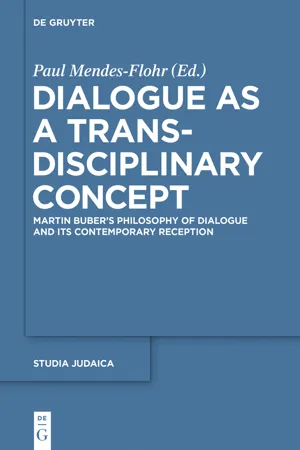
- 226 pages
- English
- ePUB (mobile friendly)
- Available on iOS & Android
Dialogue as a Trans-disciplinary Concept
About This Book
This volume of essays constitutes a critical evaluation of Martin Buber's concept of dialogue as a trans-disciplinary hermeneutic method. So conceived, dialogue has two distinct but ultimately convergent vectors. The first is directed to the subject of one's investigation: one is to listen to the voice of the Other and to suspend all predetermined categories and notions that one may have of the Other; dialogue is, first and foremost, the art of unmediated listening. One must allow the voice of the Other to question one's pre-established positions fortified by professional, emotional, intellectual and ideological commitments. Dialogue is also to be conducted between various disciplinary perspectives despite the regnant tendency to academic specialization. In recent decades' an increasing number of scholars have come to share Buber's position to foster cross-disciplinary conversation, if but to garner, as Max Weber aruged, "useful questions upon which he would not so easily hit upon from his own specialized point of view." Accordingly, the objective of this volume is to explore the reception of Buber's philosophy of dialogue in some of the disciplines that fell within the purview of his own writings: Anthropology, Hasidism, Religious Studies, Psychology and Psychiatry.
Frequently asked questions
Information
Endnotes
(Jerusalem: The Israel Academy of Sciences and Humanities/Syracuse: Syracuse University Press, 2002), 1–24.
Table of contents
- Cover
- Title
- Copyright
- Table of Contents
- Paul Mendes-Flohr
- Jürgen Habermas
- Julia Matveev
- Jeffrey Andrew Barash
- Samuel Hayim Brody
- Ran HaCohen
- Irene Kajon
- Karl-Josef Kuschel
- Yoram Bilu
- Andreas Kraft
- Henry Abramovitch
- Alan J. Flashman
- Aleida Assmann
- Contributors
- Endnotes
- Subject index